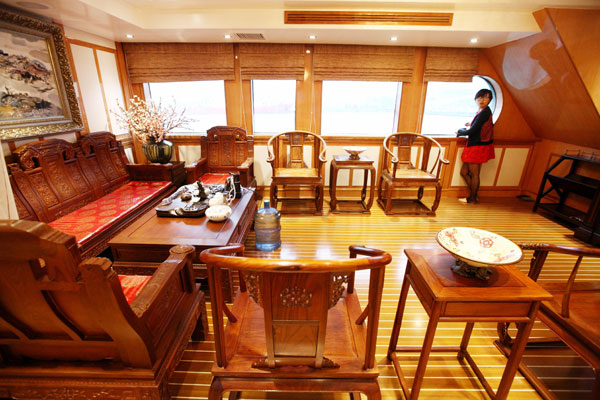Yacht industry sails ahead
Updated: 2013-06-12 02:39
By Wang Wen and Li Fangfang (China Daily)
|
||||||||
 |
|
The interior of the Fortuna, a luxury yacht. It made its maiden voyage on May 18 in Qingdao, Shandong province. Xu Chongde / For China Daily |
Foreign players
Foreign yacht manufacturers are also expecting a boom and they're already eyeing the Chinese market.
For instance, the Hong Kong-based Jebsen Marine plans to set up eight dealerships in Beijing and other coastal mainland cities over the next two to three years, in a bid to meet the rapidly increasing demand for luxury boats.
And other companies are also vying for the Chinese market.
"China now takes the No 1 position in our global strategy, as the emerging markets led by China are offsetting our waning business in mature European markets, which were seriously impacted by the economic slowdown," said Bjorn Ingemanson, president of Volvo Penta, Europe's largest industrial and marine power systems provider.
Volvo Penta invested 500 million yuan in the Chinese market in the past three years, and the rising leisure boat market in China will be the company's major growth engine over the next years, he said.
"China is somehow like an early teenager in the yacht industry, eager to learn and growing fast," he said.
In 2012, Volvo Penta sold around 5,000 marine engines in China, a 15 to 20 percent year-on-year growth.
The yacht engine builder is now targeting 15 percent annual growth in the coming years, Ingemanson said, though the business in China is still relatively modest compared with those in Western markets.
"We will see a sharp growth trend there," he added.
He said that his confidence comes not only from the rising local market, but also from the fact that more European-made boats are being imported into China.
Data from the CCYIA showed that the number of boats imported to China increased 63.27 percent year-on-year in 2012.
The United Kingdom and Italy are the two main exporters, industry insiders said.
"International yacht manufacturers have a very bright outlook in the Chinese market, as their sales in China are increasing sharply," said Zheng at the CCYIA.
A growing number of European yacht manufacturers are planning to set up plants in China.
At the same time, domestic companies are also acquiring foreign players.
In 2012, China's equipment manufacturer Weichai Holding Group Co Ltd - the largest subsidiary of the Shandong Heavy Industry Group - bought a 75 percent stake in debt-laden Italian luxury yacht maker Ferretti Group for 178 million euros ($229.53 million).
Other leading yacht brands, including Azimut Yachts, Princess and Sessa Marine, also expressed interest in having production bases in China.
"It's a good (place) for the struggling European marine industry, which shrank by 50 percent compared with 2008," said Ingemanson.
And the move should also be positive for China's yacht industry as the foreign rivals' foray into the local market may help domestic players improve their quality standards and technology amid the intensifying competition, he said.
Meanwhile, Chinese companies are facing two distinct business situations.
Most Chinese yacht makers mainly exported their production in the past, while others moved into the domestic market earlier and grabbed some market share.
For instance, Zhuhai Sunbird Yacht Manufacturing Co, a major manufacturer in China, posted total revenue of 582 million yuan in 2012, up 46.9 percent year-on-year, according to the company's annual report.
The manufacturer, which has a 47.5 percent market share of China's special yacht market, forecast that they will get and deliver special yacht orders worth 500 million yuan in 2013.
But some other Chinese manufacturers have to deal with dwindling sales due to the lackluster global economic situation.
Dalian in Liaoning province, a city that developed a yacht industry some years ago, has about 15 yacht builders with an annual output of 250 million yuan, but the city's leisure boat industry saw a 50 percent drop in sales in 2012, the CCYIA said.
No more than 20 percent of the yachts made in Dalian are sold to domestic clients and the shrinking global market had a great impact on the companies in the city.
The lack of support facilities is also limiting the sales of leisure boats.
There were 46 yacht clubs in the mainland by April 2013 with 6,404 berths, but berths are still in short supply, the CCYIA said.
That situation also translates into business opportunities for Chinese investors.
The Fortune Character Institute said that marinas are the most promising investment in China's yacht sector.
"The Chinese real estate industry will show stronger interest to invest in the yacht industry," Zhou at the institute predicted.

 Michelle lays roses at site along Berlin Wall
Michelle lays roses at site along Berlin Wall
 Historic space lecture in Tiangong-1 commences
Historic space lecture in Tiangong-1 commences
 'Sopranos' Star James Gandolfini dead at 51
'Sopranos' Star James Gandolfini dead at 51
 UN: Number of refugees hits 18-year high
UN: Number of refugees hits 18-year high
 Slide: Jet exercises from aircraft carrier
Slide: Jet exercises from aircraft carrier
 Talks establish fishery hotline
Talks establish fishery hotline
 Foreign buyers eye Chinese drones
Foreign buyers eye Chinese drones
 UN chief hails China's peacekeepers
UN chief hails China's peacekeepers
Most Viewed
Editor's Picks

|

|

|

|

|

|
Today's Top News
Shenzhou X astronaut gives lecture today
US told to reassess duties on Chinese paper
Chinese seek greater share of satellite market
Russia rejects Obama's nuke cut proposal
US immigration bill sees Senate breakthrough
Brazilian cities revoke fare hikes
Moody's warns on China's local govt debt
Air quality in major cities drops in May
US Weekly

|

|







